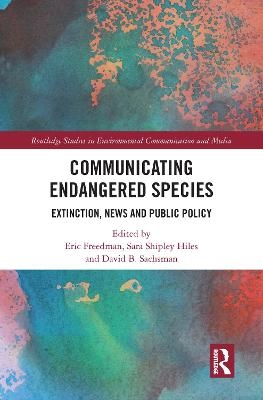
Communicating Endangered Species
Routledge (Verlag)
978-0-367-48621-1 (ISBN)
Communicating Endangered Species: Extinction, News, and Public Policy is a multidisciplinary environmental communication book that takes a distinctive approach by connecting how media and culture depict and explain endangered species with how policymakers and natural resource managers can or do respond to these challenges in practical terms.
Extinction isn’t new. However, the pace of extinction is accelerating globally. The International Union for Conservation of Nature classifies more than 26,000 species as threatened. The causes are many, including climate change, overdevelopment, human exploitation, disease, overhunting, habitat destruction, and predators. The willingness and the ability of ordinary people, governments, scientists, nongovernmental organizations, and businesses to slow this deeply disturbing acceleration are uncertain. Meanwhile, researchers around the world are laboring to better understand and communicate the possibility and implications of extinctions and to discover effective tools and public policies to combat the threats to species survival. This book presents a history of news coverage of endangered species around the world, examining how and why journalists and other communicators wrote what they did, how attitudes have changed, and why they have changed. It draws on the latest research by chapter authors who are a mix of social scientists, communication experts, and natural scientists. Each chapter includes a mass media and/or cultural aspect.
This book will be essential reading for students, natural resource managers, government officials, environmental activists, and academics interested in conservation and biodiversity, environmental communication and journalism, and public policy.
Eric Freedman is Director of the Knight Center for Environmental Journalism and Professor of Journalism at Michigan State University, USA. He is the co-editor of Environmental Crises in Central Asia (Routledge, 2015) and Biodiversity, Conservation and Environmental Management in the Great Lakes Basin (Routledge, 2018) and he has won a Pulitzer Prize in Journalism. Sara Shipley Hiles is Associate Professor at the University of Missouri-Columbia, USA. She is a journalism educator and an award-winning journalist who specializes in environmental and investigative reporting with more than 25 years’ experience in the field. David B. Sachsman holds the George R. West, Jr. Chair of Excellence in Communication and Public Affairs at the University of Tennessee at Chattanooga, USA. He is managing editor of Applied Environmental Education and Communication, an international journal, editor of the Routledge Handbook of Environmental Journalism (Routledge, 2020), and author of Environment Reporters in the 21st Century (Routledge, 2010).
1. Exploring the Terrain: Connecting communication, public policy, and the brink of extinction Part I: News Coverage of Endangered Species around the World 2.Endangered Species, News, and Public Policy: A history 3. The Extinction Crisis: Why Words Matter 4. The Wolves of Fate: Media coverage of the Isle Royale "genetic rescue" 5. How African are African Elephants? Reflections on poaching and conservation in African and UK newspapers Part II: Images of Endangered Species: Communication and Public Opinion 6. Turtle Tourism and Conservation: Conflict and concord on a Hawaiian beach 7. The 25 Most Endangered Primates List: Impacts on conservation fundraising and policy 8. You Better Believe It: Rhino horns are a bloody risky business PART III: Media Emphasize the Charismatic: Ignoring the Rest 9. Front Pages Are for the Charismatic: The case of the cute giant panda 10. Polar Bears as Cultural Symbols: Threatening Monsters and Threatened Species
11. Societal Attitudes towards Hellbender Salamander Conservation: The roles of traditional and social media Part IV: Environmental Public Policy 12. (Not) Saving the Great Barrier Reef from Disaster: Media then and now 13. Communicating Shark Extinction: Celebrity-endorsed conservation campaigns and public policy in China 14. Manatees and fossil fuel power plants: The paradox of endangered species laws 15. Conservation on Private Land: The Endangered Species Act 16. Preserving endangered species: Communicating, reporting, and framing the extinction crisis
| Erscheinungsdatum | 06.08.2021 |
|---|---|
| Reihe/Serie | Routledge Studies in Environmental Communication and Media |
| Zusatzinfo | 10 Tables, black and white; 5 Line drawings, black and white; 24 Halftones, black and white; 29 Illustrations, black and white |
| Verlagsort | London |
| Sprache | englisch |
| Maße | 156 x 234 mm |
| Gewicht | 720 g |
| Themenwelt | Naturwissenschaften ► Biologie ► Ökologie / Naturschutz |
| Sozialwissenschaften ► Kommunikation / Medien ► Kommunikationswissenschaft | |
| Technik ► Umwelttechnik / Biotechnologie | |
| ISBN-10 | 0-367-48621-0 / 0367486210 |
| ISBN-13 | 978-0-367-48621-1 / 9780367486211 |
| Zustand | Neuware |
| Informationen gemäß Produktsicherheitsverordnung (GPSR) | |
| Haben Sie eine Frage zum Produkt? |
aus dem Bereich


